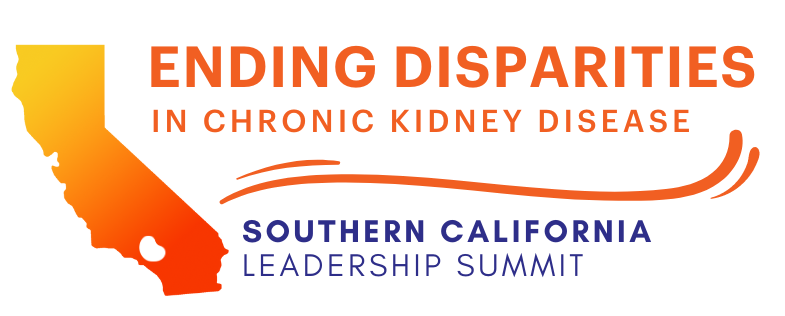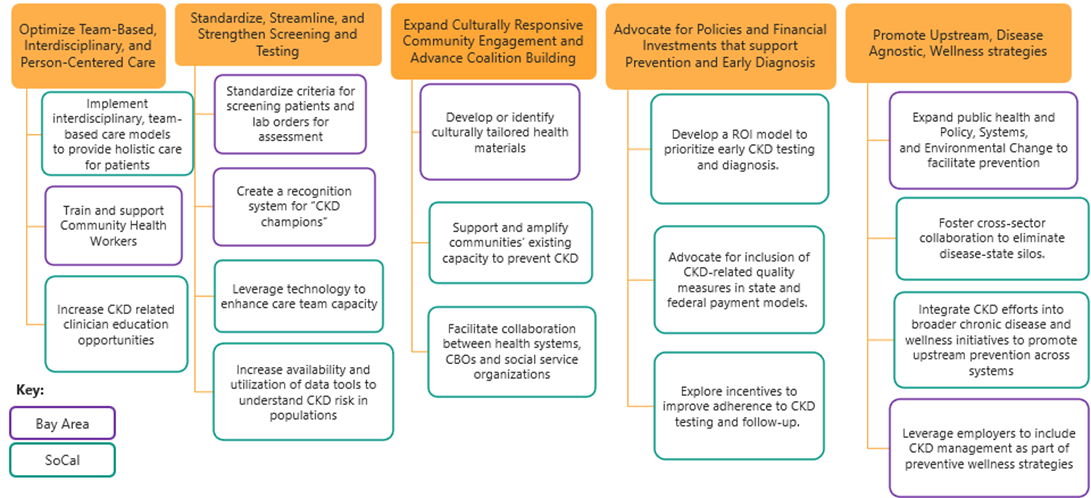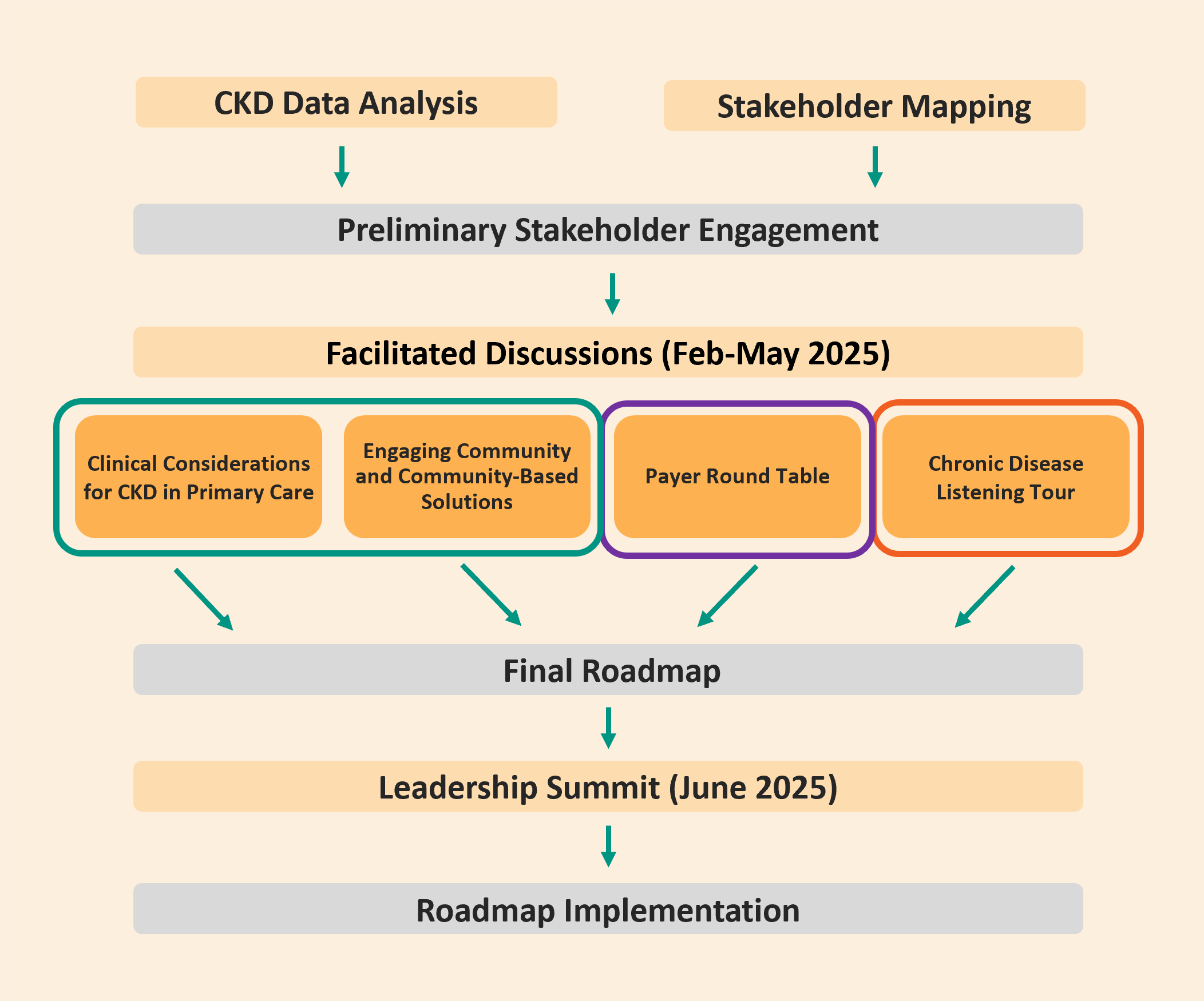
About the Initiative
The Ending Disparities in CKD Leadership Summit convenes stakeholders to identify strategies and solutions across sectors to equitably increase early diagnosis and management of CKD.
In 2024, NKF convened 59 stakeholders in the Bay Area and generated 13 recommendations. In 2025 NKF aims to convene stakeholders in Southern California to build on momentum generated from the Bay Area Summit, determine how to advance statewide strategies (policy change, coalitions, etc.), and create tailored strategies to serve the unique needs of local communities in Southern California. The Southern California Summit virtual convening took place on June 24th 2025. Access the Summit recording here.
Visit our California page for the latest updates on implementation efforts.
Land Acknowledgement
While we refer to Southern California, we recognize that this region stands upon the ancestral and unceded territories of the Chumash, Alliklik, Kitanemuk, Serrano, Tongva, Luiseño, Cahuilla, Cupeño, Chemehuevi, Kumeyaay, and Tactic peoples. We recognize both the historical and ongoing injustices experienced by Indigenous communities—including the impacts of settler-colonization and genocide—as well as their resilience and achievements.
In the spirit of continuous learning and accountability, we humbly offer the following resources for further exploration:
Learning and Action Workgroups
Through a series of facilitated discussions, occurring in 2025, stakeholders will identify barriers and solutions to improve CKD awareness, detection, and management in Southern California, and especially tools and strategies that can be implemented within stakeholders' own institutions. Four workgroups will convene covering the following topics:
Clinical Considerations for CKD in Primary Care
- Goal: Discuss and develop strategies and approaches that can be employed to improve CKD recognition and care in primary care settings.
- Background: A large, national study illustrated that less than 12% of people with CKD were diagnosed in primary care. This included as many as 40% of people whose kidneys required specialty care. With the advent of new therapies demonstrated to slow or stop the progression of CKD, there is a very real opportunity to improve quality of care for people with CKD across the entire disease spectrum.
Community-Centered Engagement and Solutions
- Goal: Develop strategies to advance CKD awareness through community engagement and to ensure that health care providers are aware of the community resources available to delay CKD progression.
- Background: In the U.S., only 10% of individuals with laboratory-confirmed CKD are aware they have the condition. Improving patient awareness, engagement, and self-management is crucial for slowing CKD progression. Since diabetes and hypertension are major contributors to CKD, partnering with community organizations that support people with these chronic conditions is essential for raising awareness of CKD among those at risk.
Chronic Disease Prevention and Wellness Listening Tour
- Goals:
- Align with/ support broader population health and policy, systems, and environmental change efforts
- Develop shared messaging and health promotion or wellness programs
- Background: One of the key themes from the Bay Area Summit’s roadmap is to identify opportunities for disease agnostic interventions and upstream prevention of chronic disease. The National Kidney Foundation (NKF) recognizes that collaboration is an essential component to effectively address the interconnected risk-factors of cardiovascular-kidney-metabolic syndrome and related chronic diseases. To strengthen our impact through mission-aligned partnerships, the NKF team is launching a Listening Tour in California. This will involve engaging with chronic disease prevention organizations to learn about their work, explore alignment, and assess opportunities for the NKF to amplify our shared goals and improve the health of our communities.
- Objectives:
- Learn about the organization and their work
- Identify opportunities for alignment
- Considerations for partnership
- Organizations/ Coalitions to engage (both regional and statewide groups):
- Local public health departments
- Chronic disease organizations
- Wellness organizations
California Payer Roundtable
- Goals: Through the California Payer Roundtable, the NKF aims to convene payers (health plans, employers, state agencies) to discuss the importance of CKD population health to improving chronic disease outcomes and reducing health care costs. During this virtual meeting participants will:
- Review the clinical and financial evidence associated with CKD under-recognition and management.
- Identify areas of opportunity to work across the broader health system in California to support the improvement of chronic disease outcomes, building on the recommendations generated during the Bay Area Summit.
- Explore opportunities for prioritization and alignment on quality measures to improve chronic disease care and outcomes, including CKD testing.
Background: During the Bay Area summit, stakeholders highlighted the challenges of the current quality improvement landscape in health care. Efforts to improve quality have resulted in a large number of quality measures, which stretch the capacity and bandwidth of care providers. Attempts to streamline quality measures have been helpful to reduce competing priorities, but can make it difficult to bring visibility and focus into areas like CKD that are not explicitly called out on current measure sets (despite having impacts on outcomes of current measures). There are also issues with reimbursement and payment models, especially in FQHC and safety net settings, that can make it difficult to appropriately address the underlying patient needs that can impact quality improvement outcomes. Attendees will discuss these challenges and opportunities and work to find tangible solutions to address these challenges, and generate a state level payer roadmap.
Final Roadmap
Through a series of facilitated discussions, 27 stakeholders representing 23 organizations identified 11 strategies to improve testing, diagnosis, and early management of CKD in California. Please read the executive summary here.
Leadership Summit
On June 24, 2025 NKF serving CA, NV, OR, and WA hosted a virtual summit to present the final recommendations and engage partners in supporting the California-wide roadmap. 86 registered and nearly 50 attended the live summit with 66 commitments to support implementation of the 17 recommendations.
Results of the Discussions
During the facilitated discussions, stakeholders identified several barriers to CKD testing, diagnosis, and management.
Barriers Identified:
- Limited Primary Care Capacity and Systemic Support
- Limited CKD Awareness and Education
- Structural Barriers that Disproportionately Impact Underserved Communities
- Gaps in Data Infrastructure and Technology Integration
- Fragmentation in Care Coordination and Communication
Please see Executive Summary for more details regarding recommendations.

Join Us!
The NKF is committed to advancing population health initiatives focused on CKD and chronic disease prevention, and prioritizing the well-being of our communities. Achieving sustainable system change requires careful planning, collaboration, and time—and we need your support!
If you're interested in partnering on any of the recommendations currently in progress or other ideas, please reach out to us. Thank you for your commitment to this vital work!
- Nina Sherpa-Pine (she/her/hers/any pronouns used respectfully), Director of Community Impact and Health Partnerships: nina.sherpapine@kidney.org
- Mallory Caron (she/her/hers), Senior Manager Population Health Partnerships: mallory.caron@kidney.org
